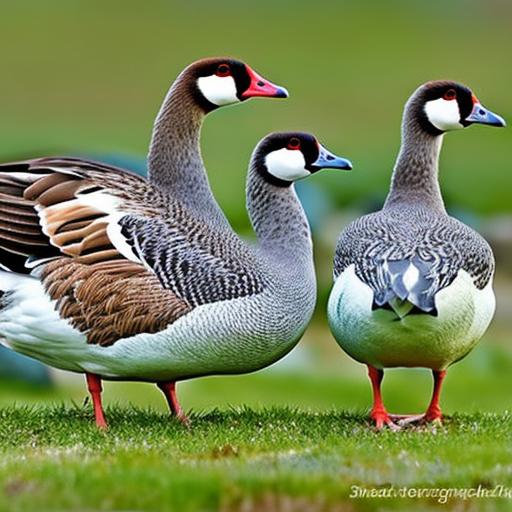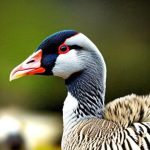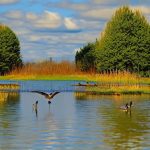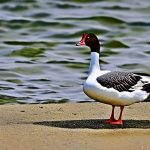Geese are a common sight in many areas, whether it be in parks, on golf courses, or near bodies of water. These large birds are known for their distinctive honking and their tendency to gather in large flocks. While they may seem harmless, geese can cause significant damage to grass and beaches if left unchecked. Understanding how to deter geese from your property is important for maintaining the health and aesthetics of your outdoor spaces.
Key Takeaways
- Geese are social birds that mate for life and can live up to 25 years.
- Geese can cause significant damage to grass and beaches through their droppings and feeding habits.
- Natural deterrents such as landscaping and noise can be effective in keeping geese away.
- Physical barriers like fences and netting can also prevent geese from accessing your property.
- Decoys and scare tactics like predator sounds and motion-activated sprinklers can be used to scare geese away.
Understanding the Damage Caused by Geese
Geese can cause extensive damage to grass and beaches through their feeding habits and waste. When geese graze on grass, they pull it up by the roots, leaving behind bare patches and uneven terrain. This can make it difficult for grass to grow back and can result in unsightly and damaged lawns. Similarly, when geese frequent beaches, they can trample vegetation and disturb sand dunes, leading to erosion and loss of habitat for other species.
In addition to the physical damage they cause, geese also have negative impacts on the environment and human health. Their waste contains high levels of nitrogen and phosphorus, which can lead to water pollution when it washes into nearby bodies of water. This excess nutrient runoff can contribute to algal blooms and oxygen depletion, harming aquatic ecosystems. Furthermore, goose droppings can carry bacteria such as E. coli, posing a risk to human health if people come into contact with contaminated water or surfaces.
Natural Ways to Deter Geese
There are several natural methods that can be used to deter geese from your property. One effective strategy is to plant certain types of vegetation that geese find unappealing. For example, tall grasses or plants with prickly leaves can discourage geese from landing or grazing in an area. Additionally, using noise deterrents such as wind chimes or predator calls can startle geese and make them feel unsafe, causing them to seek out quieter areas. Another option is to install motion-activated sprinklers that spray water when geese approach, creating an unpleasant experience for them.
Installing Physical Barriers
If natural deterrents are not enough, installing physical barriers can be an effective way to keep geese away from your property. Fencing options such as low fences or electric fences can prevent geese from accessing certain areas. Netting solutions can also be used to cover grass or beach areas, making it difficult for geese to land or walk on. Other physical barriers, such as floating ropes or inflatable scarecrows, can be placed in bodies of water to deter geese from swimming or congregating in certain areas.
Using Decoys and Scare Tactics
Decoys and scare tactics can be effective in deterring geese by creating the illusion of a predator or danger. Decoys such as plastic owls or coyotes can be placed in areas where geese are a problem, making them think twice about landing or grazing. Scare tactics such as loud noises, such as air horns or banging pots and pans together, can startle geese and make them feel threatened. These methods work best when they are unpredictable and varied, as geese can become accustomed to repetitive scare tactics.
Creating an Unattractive Environment for Geese

Creating an unattractive environment for geese is another way to deter them from your property. Removing food sources, such as spilled birdseed or uncovered garbage cans, can discourage geese from lingering in an area. Keeping grass short and well-maintained can also make it less appealing for geese to graze. Additionally, cleaning up debris and trash regularly can eliminate potential nesting sites and reduce the overall attractiveness of an area to geese.
The Benefits of Professional Geese Control Services
While there are many DIY methods for deterring geese, sometimes it is best to enlist the help of professional geese control services. These professionals have the knowledge and experience to effectively manage geese populations and implement long-term solutions. They can conduct site assessments, develop customized management plans, and provide ongoing monitoring and maintenance. Some services may also offer humane trapping and relocation options for geese that are causing significant damage or posing a threat to public safety.
Legal Considerations
When it comes to geese control, it is important to be aware of the legal considerations. In many areas, geese are protected under federal or state laws, making it illegal to harm or kill them without proper permits. It is important to familiarize yourself with the specific laws in your area and ensure that any deterrent methods you use are within legal boundaries. Consulting with local wildlife authorities or professional geese control services can help ensure that you are in compliance with the law while effectively managing geese populations.
Best Practices for Maintaining a Healthy Lawn and Beach
In addition to implementing deterrent methods, there are several best practices for maintaining a healthy lawn and beach that can help prevent damage caused by geese. If your grass has been damaged by geese, it is important to repair the bare patches by reseeding or laying new sod. Regularly fertilizing and aerating your lawn can also promote healthy grass growth and make it more resilient to damage. For beaches, planting native vegetation can help stabilize sand dunes and provide habitat for other species.
To prevent future damage, it is important to address the underlying factors that attract geese to your property. This includes removing food sources, keeping grass short, and cleaning up debris and trash regularly. Additionally, implementing a combination of natural deterrents, physical barriers, decoys, and scare tactics can help create an environment that is unattractive to geese.
Conclusion and Final Tips
In conclusion, understanding how to deter geese from your property is important for maintaining the health and aesthetics of your outdoor spaces. Geese can cause significant damage to grass and beaches through their feeding habits and waste, as well as have negative impacts on the environment and human health. By implementing a combination of natural deterrents, physical barriers, decoys, scare tactics, and creating an unattractive environment for geese, you can effectively manage geese populations and prevent damage.
It is also important to be aware of the legal considerations when it comes to geese control and to stay within legal boundaries. Consulting with local wildlife authorities or professional geese control services can help ensure that you are in compliance with the law while effectively managing geese populations. Finally, maintaining a healthy lawn and beach involves repairing any damage caused by geese, implementing best practices for lawn and beach maintenance, and addressing the underlying factors that attract geese to your property. By following these tips, you can keep geese off your grass and beach and maintain a beautiful outdoor space.
If you’re looking for ways to keep geese off your grass and beach, you might also be interested in learning how to insulate a chicken coop. A well-insulated coop not only helps keep your chickens warm during colder months but can also deter geese from nesting in the area. Poultry Wizard offers a comprehensive guide on how to properly insulate your chicken coop, ensuring the comfort and safety of your feathered friends while keeping unwanted visitors at bay. Check out their article on how to insulate a chicken coop for valuable tips and techniques.
FAQs
What are some effective ways to keep geese off my grass and beach?
There are several effective ways to keep geese off your grass and beach, including using decoys, installing fencing, using repellents, and modifying the landscape.
What kind of decoys can I use to keep geese away?
You can use decoys that resemble natural predators of geese, such as coyotes, foxes, and owls. You can also use decoys that resemble other geese to deter them from landing in your area.
What kind of fencing is best for keeping geese away?
A fence that is at least 3 feet tall and has small mesh or wire spacing is best for keeping geese away. You can also install an electric fence to further deter them.
What kind of repellents can I use to keep geese away?
There are several types of repellents that can be effective in keeping geese away, including visual repellents, such as reflective tape and scarecrows, and auditory repellents, such as loud noises and distress calls.
How can I modify my landscape to keep geese away?
You can modify your landscape by removing any sources of food or water that may attract geese, such as bird feeders and standing water. You can also plant vegetation that geese do not like, such as prickly bushes and tall grasses.
Meet Walter, the feathered-friend fanatic of Florida! Nestled in the sunshine state, Walter struts through life with his feathered companions, clucking his way to happiness. With a coop that’s fancier than a five-star hotel, he’s the Don Juan of the chicken world. When he’s not teaching his hens to do the cha-cha, you’ll find him in a heated debate with his prized rooster, Sir Clucks-a-Lot. Walter’s poultry passion is no yolk; he’s the sunny-side-up guy you never knew you needed in your flock of friends!







